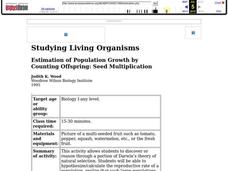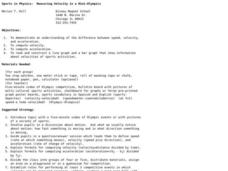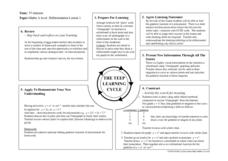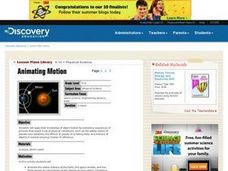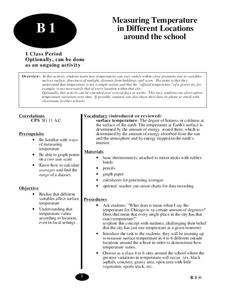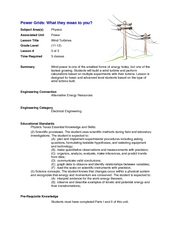Curated OER
What Do People Know About Radon?
Students complete a survey about how much they know about radon. They calculate the mean scores for each question and graph them. They discuss the results as a class.
Curated OER
What Do People Know About Radon?
Students complete and discuss a radon survery. They calculate the average for each question based on the response. They graph the responses and analyze the information.
Curated OER
Stock It To Me
Students investigate the stock market using stock market tables, charts, and graphs. They participate in a simulation of stock market investment over time. They read about the history of Wall Street and the Stock Market.
Curated OER
Estimation of Population Growth By Counting Offspring: Seed Multiplication
Learners calculate the reproductive rate of a plant that creates multi seed fruits. They graph exponential growth and the complete a series of questions that help them infer that natural selection processes are at work in this population.
Curated OER
Vertical and Horizontal Translations
Eleventh graders study seven functions. They use their handheld calculator to determine which family of functions the equation belongs, the parent function described, and they calculate the vertical and horizontal translation.
Curated OER
Engineering in a Calculus Classroom
Students solve several differential equations. In this calculus lesson, students test their modulus calculation by testing different weights or beam lengths. They share their findings in class.
Curated OER
Fly Away With Averages
Students discover the process of finding the mean, median, and mode. Through guided practice and problem solving activities, they use a computer program to input data and create a graph. Graph data is used to calculate the mean,...
Curated OER
Salaries
Students are engaged in the study of salaries and how they vary according to different occupations. They conduct research using a variety of resources in order to summarize the earnings potential in the human services field.
Curated OER
How Cool Is Your Environment?
Students study the formulas for calculating heat energy and how to convert Celsius to Fahrenheit. They apply the formulas on a worksheet.
Curated OER
Sample This
Students gain a greater understanding of how statistical samples are conducted by taking polls of specific populations. These polls be expressed in graphs, which be compared with the same questions asked of other populations.
Curated OER
What's Your Expression
First graders explore facial expressions in a mirror and create drawings of people with a facial expression of their choice. They graph the facial expressions drawn.
Curated OER
Peak Flow Meter Exercise
Students investigate the concept of lung capacity. They use flow meters to measure the maximum capacity of themselves and others. The data is collected in order to make some conclusions concerning the mean of individual lung capacity....
Curated OER
Pulse Rates
Students answer the question, "How will the intensity of exercise effect your heart rate?", using physical workouts and AppleWorks, or similar spreadsheet program. This lesson can conclude with the creation of a graph of data collected.
Curated OER
Missed The Boat
Students complete time and distance problems. Using appropriate problem solving strategies, students determine when a helicopter will catch a cruise ship. Students write a summary of their solution process. They complete a graph to...
Curated OER
Sports in Physics: Measuring Velocity in a Mini-Olympics
Eighth graders examine the difference between speed, velocity and acceleration. In this velocity lesson students read and construct a line graph and a bar graph to show information about velocities of sports activities.
Curated OER
Buying My First Car
Students pretend they are about to buy their first new car. They must do all the calculations necessary to estimate the cost of purchasing the car. They see that the math they learn in school really does have real-life applications.
Curated OER
Using Parallax to Determine Distances
Learners examine the concept of parallax. They determine a method to calculate the distance of objects from their data, participate in a demonstration, and describe how our eyes use parallax to determine the distance of objects.
Curated OER
Irregular Fractals
Students study and research irregular fractals and construct a few based on their research. Students practice pattern recognition skills and plane geometry skills calculating dimensions on the Fractured Pictures activity.
Curated OER
Math- A Level Differentiated Lesson
Students investigate the gradient function of a polynomial and they conduct a class discussion about its meaning. Then students use graphing software in order to examine tangents that can be seen visually to aid those who need visual...
Curated OER
Animating Motion
Young scholars apply what they recall about objects in motion by animati ng sequences of pictures that model a set of physical conditions. They animate the orbital motions of the Earth, the space shuttle, and the Moon based on...
Curated OER
Measuring Temperature
Students explore the different variables that affect surface temperature. They study how temperatures can vary widely within close proximity due to variables such as surface, directness of sunlight, and distance from buildings.
Curated OER
Math: a World of Symmetry
Pupils expand their knowledge of quadrilaterals and identify basic symmetrical forms. Over three weeks, they explore the math, application, and discussion of symmetry. After conducting Internet research, students create symmetrical...
Curated OER
Determining Momentum and Energy Loss of Balls Colliding Against Different Surfaces
Young scholars experiment with the bounce of balls on various surfaces. In this physics activity, students use various surfaces to bounce balls to study the momentum. This hands-on activity with the concepts of elasticity of surfaces...
Curated OER
Wind Turbines
Learners build their own wind turbine. In this physics lesson, students calculate the power output of their wind turbines. They evaluate their design and make the necessary modifications.





